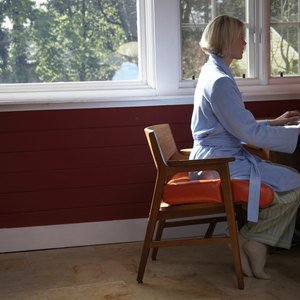
When you work out of your home or apartment, you don't have a separate business rental bill to show the Internal Revenue Service at tax time to justify a business expense. However, that doesn't mean you miss out on a deduction completely: The IRS permits eligible owners and renters who use a portion of their living space for business activities to claim a home office deduction.
Home Office Deduction Eligibility
Though renting doesn't disqualify you from the home office deduction, you won't be able to claim it if you don't meet other criteria. The space you claim as your office must be your principal place of business and you must use it regularly and exclusively for business. For example, if you have a study in your apartment and you use it to work but also to read or watch TV, you can't claim the deduction because you don't use it exclusively for business. Your business doesn't have to be limited to your office, though. For example, if you schedule all your meetings, keep track of your books and do prep work in your office, but you also visit clients there, you can still claim the deduction. In addition, if you're an employee, you must work from your home for the benefit of your employer. You can't simply stay home rather than go into the office and say you have a home office.
Calculating Your Deduction
The traditional method of calculating your home office deduction is to figure the percentage of your space that you use for business purposes and deduct that portion of your expenses, including rent, utilities and insurance. For example, if you pay $700 in housing costs each month and use 20 percent of your apartment as a home office, you can deduct $140 per month. The IRS starting in 2013 permitted filers to use a simplified method if the space was less than 300 square feet: Instead of deducting a percentage of your total costs, you can simply write off $5 per square foot.
Claiming Your Deduction
If you're self-employed, you claim the home office deduction on Schedule C and it directly reduces your self-employment income. That means it reduces both your self-employment taxes and your income taxes. If you're an employee, you can claim the deduction on Schedule A, but only if you itemize your deductions. If you don't itemize, it won't help you. And, it only reduces your income taxes, not your payroll taxes.
Renting from Yourself
If you haven't created a separate entity, or you have a single-member limited liability company that is a disregarded entity for tax purposes, you can't pay rent to yourself to shift income. But if you have created a separate entity for your LLC, S corporation or C corporation, you may have the entity rent a room in your home to use as an office. When you do this with a business you're running, the IRS considers this a "self-rental." In this situation, the entity claims a deduction for the cost of the rent it pays to you as a business expense and you must report it as rental income; you don't claim a deduction for your home office because the entity is renting the space from you. The rent must be fair market value, otherwise it isn't an ordinary and necessary business expense. Special rules determine which losses may be deductible each year. Because of the complexities of the tax code, consider consulting an accountant or tax attorney if you are considering this option.
References
- IRS: Home Office Deduction
- IRS: Publication 587
- IRS: Simplified Option for Home Office Deduction
- Internal Revenue Service. "Tax Reform: What’s New for Your Business," Pages 3–4. Accessed Oct. 19, 2019.
- Internal Revenue Service. "Tax Reform Provisions that Affect Individuals." Accessed Oct. 19, 2019.
- Internal Revenue Service. "Tax Cuts and Jobs Act, Provision 11011 Section 199A - Qualified Business Income Deduction FAQs." Accessed Oct. 9, 2019.
- United States Congress. "H.R.1 - An Act to provide for reconciliation pursuant to titles II and V of the concurrent resolution on the budget for fiscal year 2018." Accessed Oct. 9, 2019.
- Social Security Administration. "If You Are Self-Employed," Page 1. Accessed Oct. 9, 2019.
- Internal Revenue Service. "Topic No. 554 Self-Employment Tax." Accessed Oct. 9, 2019.
- Internal Revenue Service. "Publication 587 (2018), Business Use of Your Home." Accessed Oct. 9, 2019.
- Internal Revenue Service. "About Form 8829, Expenses for Business Use of Your Home." Accessed Oct. 9, 2019.
- Internal Revenue Service. "Publication 535 (2019), Business Expenses." Accessed March 16, 2020.
- Internal Revenue Service. "Travel, Gift, and Car Expenses," Page 5. Accessed Oct. 9, 2019.
- Internal Revenue Service. "Tax Guide for Small Business," Page 40. Accessed Oct. 9, 2019.
- Internal Revenue Service. "Retirement Plans for Small Business (SEP, SIMPLE, and Qualified Plans)," Page 2. Accessed Oct. 9, 2019.
- Internal Revenue Service. "Retirement Plans for Small Business (SEP, SIMPLE, and Qualified Plans)," Page 18. Accessed Oct. 9, 2019.
Writer Bio
Based in the Kansas City area, Mike specializes in personal finance and business topics. He has been writing since 2009 and has been published by "Quicken," "TurboTax," and "The Motley Fool."

